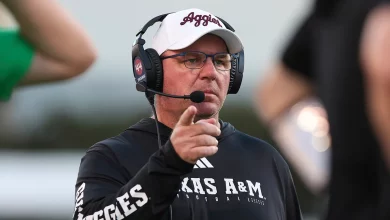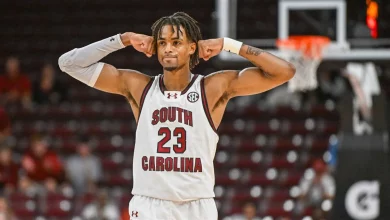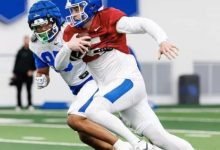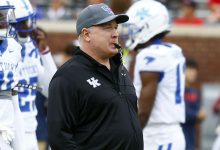Jayson Tatum Nearly Left Boston Before Stardom—How Gordon Hayward’s Injury Sparked Celtics’ Franchise Revival and Tatum’s Championship Legacy

When Jayson Tatum was drafted by the Boston Celtics in 2017, few knew that the quiet, confident rookie from Duke would one day become the face of one of the NBA’s most storied franchises. Fewer still knew how close he came to walking away before he ever truly arrived.
What looked like a sure-fire future of dominance and stardom in Boston nearly ended before it began—not due to drama or dysfunction, but due to fit.
Drafted With Promise, Overshadowed by Investment
The summer of 2017 was a pivotal time for the Celtics. The franchise was transitioning from its Isaiah Thomas-led era into a new chapter. That offseason, Celtics President of Basketball Operations Danny Ainge made two significant moves: he drafted Jayson Tatum with the third overall pick and signed Gordon Hayward to a massive four-year, $128 million deal.
Hayward, a proven All-Star under head coach Brad Stevens at Butler and again in Utah, wasn’t just brought in to be a contributor—he was expected to be the guy. The Celtics essentially handed him the keys to the offense. Tatum, meanwhile, was viewed as a project with high upside—a long, smooth scorer who might need time to develop.
Both Hayward and Tatum played the same position. Both needed the ball. And Boston was never expected to be Tatum’s team—at least not right away.
One Night Changed Everything
Then came opening night.
On October 17, 2017, just five minutes into the season opener against the Cleveland Cavaliers, Hayward suffered one of the most gruesome injuries in modern NBA history—a fractured tibia and dislocated ankle. It was a moment that stunned the league and left a void in Boston’s game plan.
Suddenly, all the minutes, touches, and expectations intended for Hayward shifted squarely onto the shoulders of 19-year-old Jayson Tatum. There was no time to ease into the NBA. He was thrown into the fire.
Tatum not only survived—he thrived.
Alongside fellow young star Jaylen Brown and seasoned veteran Al Horford, Tatum helped propel the Celtics to the Eastern Conference Finals, where they fell just one game short of the NBA Finals in a seven-game series against LeBron James and the Cavaliers. He averaged 18.5 points per game in the playoffs and played with a poise far beyond his years.
The Truth Comes Out: Hayward’s Admission
Years later, Hayward himself would reflect on what could have been if not for the injury.
“I was at the brim of my career,” Hayward admitted in an interview. “Coach probably would’ve drawn plays for me, not JT.”
He wasn’t wrong. At that moment in 2017, Hayward was a proven commodity. Tatum, as talented as he was, would have had to wait his turn.
The truth was that the injury, tragic as it was, changed the Celtics’ long-term identity. It thrust Tatum into a leading role that may not have otherwise materialized for years—if ever.
Tatum’s Internal Conflict
While Tatum never made public statements about leaving Boston, multiple reports and whispers have since emerged suggesting that early in his tenure, he questioned whether the Celtics were truly his long-term home.
There was no bitterness or ego involved. It was about finding the right fit—a team where he could blossom into what he believed he could be. Tatum saw himself as more than a complementary piece. But with Hayward in front of him, and Kyrie Irving controlling the ball, his path wasn’t clear.
For a time, it seemed like Boston might not be where Tatum’s true story would unfold.
But fate had other plans.
Staying the Course
Tatum stayed. He committed. He grew.
By the time Hayward departed for the Charlotte Hornets in 2020, Tatum had firmly cemented himself as Boston’s cornerstone. And he did it not by demanding it—but by earning it.
Tatum continued to elevate his game each year. From that rookie playoff run to All-Star appearances to All-NBA honors, and eventually to leading Boston to the 2022 and 2024 NBA Finals, including winning the title in 2024, his evolution was undeniable.
Now, Tatum is a six-time All-Star, a member of the All-NBA First Team, and a 2024 NBA Champion. He’s also a leader off the court, establishing himself as one of the league’s most respected professionals.
The What-Ifs of Celtics History
Had Hayward never suffered that injury, the course of Celtics history may look entirely different.
Would Tatum have become the star he is today in Boston? Would he have requested a trade to find a better opportunity elsewhere? Would the Celtics have missed out on the Finals appearances—and their 18th NBA title?
“It’s crazy how things work out,” Tatum once said in reflection. “You never want to see someone get hurt, especially a teammate like Gordon. But I had to step up. And I think I did.”
Even Hayward has acknowledged that Tatum’s rise was not just impressive—it was destiny.
“He’s the guy now,” Hayward said. “And he earned that.”
From Uncertainty to Legacy
The beauty of Tatum’s story lies in its unpredictability. He went from unsure rookie to franchise savior, from quiet contributor to cultural leader. He embraced the challenge thrust upon him and, in doing so, changed not only his own future but the entire trajectory of the Celtics.
His loyalty to Boston, tested but never broken, now defines his legacy.
That once-crowded wing rotation, which seemed like an obstacle, turned out to be the crucible that forged a champion.
A Lesson in Patience and Belief
In the modern NBA, where stars often move teams in search of the perfect situation, Tatum’s story stands out. It’s a testament to what can happen when a player commits to growth, embraces adversity, and chooses to write his legacy rather than run from uncertainty.
For young athletes, Tatum’s journey is a blueprint in patience. He didn’t demand change. He didn’t chase spotlight. He let the work speak.
And for Celtics fans, Tatum is not just a superstar—he’s a symbol of resilience, faith, and what can happen when talent meets opportunity.
The 2017 NBA Draft class will always be remembered for the emergence of Jayson Tatum. But more importantly, the story behind his rise will be remembered as one of fate, humility, and perseverance.
He could’ve left. But he stayed.
He could’ve been overshadowed. But he shined.
And now, with a championship in hand and his name etched into Celtics lore, Jayson Tatum has not only fulfilled his promise—he’s created a legacy that Boston will celebrate for generations.
Sometimes, the future shows up early. And when it does, all you have to do is answer the call.









